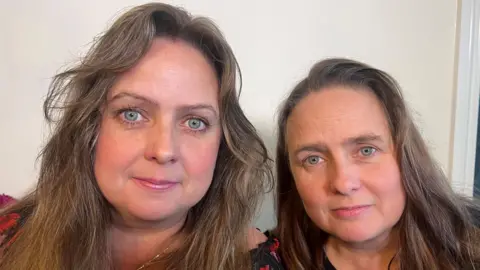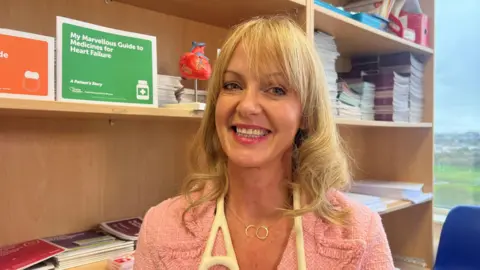 BBC
BBCTwin sisters living with heart failure are calling for an end to what they say is a postcode lottery when it comes to accessing services to help with their condition.
Nicole and Farrah live 32 miles away from each other, but are in different health trusts.
While Nicole has benefited from “life-changing” cardiac rehabilitation, Farrah says she was discharged eight months after diagnosis without any rehab being offered.
She has told BBC News NI she feels “jealous, angry, upset and scared” that she cannot access the same treatment as her twin sister.
Health trusts in Northern Ireland each set their own criteria for when they will offer cardiac rehab sessions.
‘I just thought I was dying’
Being identical twins, there are many similarities in Nicole and Farrah’s lives. The same expressions cross their faces and they have similar sparkling, bright eyes.
They also both have acute heart failure, a condition where the heart cannot pump blood around the body properly.
But where their stories differ is that they cannot both access the same treatment, because they are being treated under different health trusts.
Nicole, who lives in a Southern Trust area, was diagnosed in January last year, after months of trips back and forth to doctors to find out why she was so breathless. The news left her “petrified”.
“I just thought I was dying,” she says.
A few months later, in March 2023, her twin sister Farrah was diagnosed too – in a Northern Trust area.
She is on medications with the help of her GP and a consultant but says she has been discharged from speciality cardiac nursing.
‘I still live in fear’
Both the twins were active beforehand, going hiking and kayaking, but Nicole now says that even getting her shopping in from the car can leave her breathless.
At cardiac rehab sessions, she learns gentle exercise, advice on pacing and how to deal with the emotional side of the diagnosis.
“It has given me my life back,” she says.
“It has given me my confidence back.”
Farrah, on the other hand, says: “Cardiac rehab was not offered to me in the Northern Trust – I’ve fought for everything and not got the same help as Nicole did.”
Asked how she feels that her sister can access services that she can’t, Farrah says “very angry, scared and upset because I still live in fear”.
“I’m scared to go to sleep in case I don’t wake up again.”
She says she doesn’t know what exercise she can do, as she does not know her limits as she has not had that specialist help of someone saying, “you can push yourself a bit harder” or “oh no, that’s too much”.
She says having cardiac rehab like her sister would allow for supervision and oversight in a safe environment.
The sisters would also like to see better awareness around heart failure symptoms and investment to allow those affected to get continuity of care.
How the trusts differ
Some trusts offer cardiac rehabilitation to all heart failure patients while others have criteria to access it.
The Northern Trust say they currently offer it to heart failure patients who have had an ischaemic event, which is disruption of blood flow to the heart caused by disease of the coronary arteries.
They say they are unable to comment on individual cases but are aware of “significant demands” on the heart failure nurse clinic, and have put strategies in place which have already lowered waiting lists.
The BBC asked each trust on what basis cardiac rehabilitation is offered for heart failure patients:
- Southern – All heart failure patients are eligible for cardiac rehabilitation
- South Eastern – All heart failure patients are eligible for cardiac rehabilitation
- Northern – Currently offers cardiac rehabilitation to heart failure patients who have had an ischaemic event
- Western – All patients who have heart failure as a result of a recent heart attack will be offered cardiac rehabilitation services. For heart failure patients who have not suffered a heart attack, cardiac rehab will be offered on a case by case basis
- Belfast – Cardiac rehabilitation is offered to heart failure patients if that heart failure is a direct result of a heart attack
The Department of Health says it recognises the importance of delivering high standard, equitable and timely access to cardiac rehabilitation across the Trusts.
It said it is consulting widely with key stakeholders across all Trusts to “gain a clear understanding of the unmet needs of these services and form recommendations, which lead to long-term sustainable solutions”.

Regional approach ‘works better’
Dr Patricia Campbell, the Northern Ireland lead for heart failure, says cardiac rehab is “as effective as any medicines” when helping patients with the condition.
More women in Northern Ireland die from cardiovascular diseases than from cancer, with heart failure the least well known of those diseases.
Dr Campbell says there are about 22,000 people living in Northern Ireland with heart failure and there are likely to be many people out there living with the condition without knowing it.
She urges anyone experiencing breathlessness, fatigue or fluid retention to visit their GP for a simple blood test (BNP).
Acknowledging the different approaches in each trust she says: “Everything works better when we have a regional approach to things.”
“We have amazing heart failure nurses in Northern Ireland who are recognised internationally for the work they do, but lots of the services are at capacity.”









